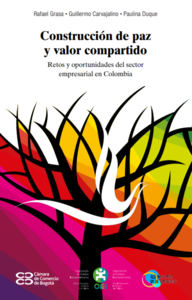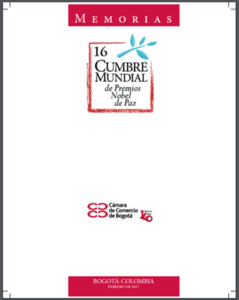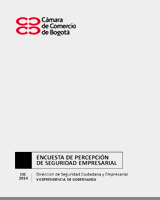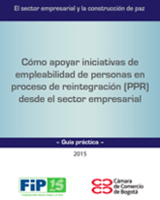Documents and relevant links
Publications | Description |
|---|---|
Infographics from ZOMAC Responsible Investment Observatory The goal of the ZOMAC Responsible Investment Observatory is to promote investment in these regions based on improved knowledge of the already established corporate fabric. On the other hand, it also helps identify the scope of tax benefits for investments and the creation of companies in the ZOMAC. As a result of the coordinated process between the CIPE, Jaime Arteaga y Asociados and the CCB, the outcome of the monitoring process and creation and survival of companies in the jurisdiction of the Florencia chambers of commerce is presented in graphic form. | |
Documento Estratégico “Construcción de paz desde Confecámaras y las Cámaras de Comercio de Colombia” El documento estratégico “Construcción de paz desde Confecámaras y las Cámaras de Comercio de Colombia”, es el producto de un convenio entre la Fundación Ideas para la Paz -FIP- y la Cámara de Comercio de Bogotá -CCB- con participación activa de la Confederación Colombiana de Cámaras de Comercio -Confecámaras-, tiene como objetivo proponer una estrategia de paz para el sistema cameral, que permita dinamizar el rol de las Cámaras de Comercio en los escenarios de posconflicto y promover la reconciliación y la construcción de paz en todos los territorios del país. | |
Peace-Building and shared values “Challenges and opportunities for the business sector” The peace building process in Colombia is an opportunity for the private sector to get actively involved in territorial development by including the population affected by the conflict, engaging in production that is responsible and respects the environment, and institutional strengthening and reconstruction of social fabric with the concept of shared value, understood as business innovations that are not just profitable but also generate social and environmental benefits in their settings. The relation between shared value and peace building has not been sufficiently studied in Colombia. For that reason, from the initiative called the Shared Value Academic Network, led by the CCB and in partnership with the Organization of Ibero-American States for Education, Science and Culture (OEI, for the Spanish original), we conducted a study that would help us understand the relations between these two concepts, and the implications for businessmen and entrepreneurs in the country. | |
Works for Taxes: Measure to transform the Areas Most Affected by the Armed Conflict in Colombia Balance of the first year of implementing the Works for Taxes mechanism, one of the plans designed by the National Government included in the 2016 tax reform to drive the peace agenda. This analysis by the Ideas para la Paz Foundation, with support from the Swedish embassy and the CCB, addresses four aspects: the objective of supporting the regions most affected by the conflict, the projects bank, the relation between the state, business and citizens, and its application and sustainability. The CCB provided a space for dialogue with companies and trade unions that have used the mechanism. | |
Legal services and peace building in Colombia The project “Legal transition in Colombia: a look from the legal community” is a space to generate reflections and debates that contribute to public discussion regarding the role of legal practitioners, legal services and the legal system in building peace, as an exercise of participative citizenship. This initiative by the Chamber of Commerce of Bogotá, the ProBono Colombia Foundation, Universidad del Rosario and the Andi Chamber of Legal Services, aims to have the legal services sector contribute with its capacity, vision and experience to the debate on consolidating the Rule of Law, peace, development and expansion of the market economy. The document “Legal services and peace building in Colombia” posits the development of this project and guided dialogs about topics related to the contents of the Peace Agreement, the legal profession's role, and the impact of the transition. | |
The business and peace ecosystem in Colombia The business and peace ecosystem in Colombia contains a selection of relevant actors that work to implement policies and develop strategies for the country's post-conflict era, with special focus on the private sector's part in the effort. It is the result of a joint exercise between the CCB and Ideas para la Paz Foundation (FIP, for the Spanish original) which helped identify entities that worked on peace building in 2018. | |
Business for peace, summary of the meeting in BogotáOn November 1 and 2, 2017, Bogotá hosted the Business for Peace (B4P) annual event, the platform of the United Nations Global Compact, which drives practical collaborative actions that promote peace. The meeting, which every year brings together business leaders who promote peacebuilding actions in the framework of Corporate Social Responsibility (CSR), was organized in Colombia by the UN Peacebuilding Support Office, the Global Compact Colombian Local Network and the CCB. | |
Peace and security in Bogotá: Transformations and perspectives after the Armed ConflictColombia’s transition period from internal armed conflict to peace is also a time of uncertainty. This report by the Conflict, Security and Development Programme of the IISS shows that “the areas of Bogotá most vulnerable to violence and crime are linked to the broader urban system through public services, mobility, infrastructure and the overall functioning of the city. Therefore, what happens in one urban area has implications for other areas and communities because of the deeply interconnected nature of urban spaces”. | |
Memories from the 16th Nobel Peace Summit 2017 The CCB organized the 16th World Summit of Nobel Peace Laureates with the aim to generate areas for civil dialog in a framework of tolerance and to learn from the peacebuilding experiences of other countries and latitudes. At this summit, we progressed in the coordination of the National Peace Building and Global Development agendas. Likewise, the summit enabled the city and country to have a sincere in-depth debate about issues in a diverse, respectful and tolerant environment. The summit was an area for all citizens. This document represents a synthesis of the discussion about the role of the private sector in peace building and contains valuable messages for business people and professional economic groups. We all need to listen, because everyone needs to build peace. | |
National Enterprise Peace Survey The National Enterprise Peace Survey is a tool used in 2017 by the CCB and Confecámaras for business people from five large cities (Bogotá, Cali, Medellín, Bucaramanga and Barranquilla) and four cities close to the conflict (Villavicencio, Cúcuta, Popayán and Florencia). The aim of this survey is to improve knowledge about the business sector’s interest in peace building and to generate new information about the strategy to structure an agenda for the private sector’s participation in a post-conflict environment. | |
Recommendations on Peace Building for the First 100 Days of the Next Government – April 11, 2018 This document launches a series of recommendations on peace building so that the next government can make progress in consolidating security, inclusion and victims’ rights, considering that in the current electoral situation it is of utmost importance to work on creating proposals and areas for dialog to overcome the polarization of different political sectors, especially on matters of national interest. | |
“Diversification of Exports and the Peace Treaty” Published in Portafolio – April 2, 2018 This opinion article, written by the IFIT associate, Julián Arévalo, aims to go beyond the electoral situation of arguments for or against the peace treaty to consider the importance of taking advantage of the opportunities that said agreement provides in the country’s economic context. The country needs to diversify its exports and the peace treaty could be a great opportunity to do this. | |
Police mediation in Colombia: Basis for implementation In the framework of the Police Mediation project led by the CCB and the National Police, the diploma course was carried out on Police Mediation “Educator of Educators”, an academic program that began in 2014 and aims to provide the officers with tools to be able to serve as mediators in citizen day-to-day conflicts. This document is a guide that explains that police mediation is aimed at strengthening the capacity of preventing police activity in the various areas of coexistence. Download the document (spanish version). | |
"Los sabores de la reconciliación" (The flavors of reconciliation) Inspired by the progress of negotiations between the FARC and the Colombian Government, the CCB, Fundación Colombia con Memoria and Canal Capital joined efforts to carry out the Los sabores de la reconciliación (The flavors of reconciliation) project during the month of November 2016 at the facilities of La Cocina Taller in Bogotá. The main objective was focused on carrying out an educational exercise about the content of the General Agreement for the Termination of the Conflict and the Construction of Stable, Long-lasting Peace, signed by the FARC and the national government. This had another purpose: to carry out an exercise to eliminate the prejudices that say that a victim cannot interact with a person who is in the process of reintegrating. And also, to make entrepreneurs aware of such life experiences in order to explore peace building initiatives from the private sector. Download the document (spanish version). | |
Transitional justice and the business sector in Colombia The business sector is a decisive actor in building peace: its economic, social, political and environmental decisions can help overcome, once and for all, the conflict or exacerbate the conditions that allowed it to continue. This document is partly based on the information collected at the events and discussion panels between experts on transitional justice issues and actors from the business sector carried out in the framework of a Cooperation Agreement between the Institute for Integrated Transitions (IFIT) and the CCB. Its purpose is to approach to the main doubts of this sector in relation to the transitional justice model referred to in the Final Agreement. Download the complete document (spanish version). | |
What is the Colombian Peace Process Teaching the World? Article by Andrés Ucrós Maldonado, director of the CCB's Peace-Building Area, as published on the New England Journal of Public Policy's Web Site: New England Journal of Public Policy: vol. 29: Iss. 1, article 9 | |
This is an instrument used by the Bogotá Chamber of Commerce to entrepreneurs and businessmen in the country's capital, with the goal of proposing actions to be carried out by the National Government and the private sector, under a peace-building scenario. The Survey is comprised by three modules: Negotiations and the construction of peace, transitional justice and endorsement of the accords. Among the survey's most important characteristics is the fact that it is carried out through a randomized, stratified sampling segmented by the company's location, size and economic activity. | |
Guide for working on peace building The CCB is convinced that, with the potential signature of the peace accords and an eventual post-conflict stage coming be, the private sector is tasked with playing a key role in the re-construction of the social weave, in the strengthening of the institutions and in the promotion of development with social inclusion, based on a deep commitment towards human rights. Therefore, it has developed a Guide for the Construction of Peace; this is a publication produced by the CCB and the International Catalan Institute for Peace whose goal is to promote a reflection about the participation that the enterprise sector has in the construction of a violence-free society. | |
Business perspectives and contributions to peace building Research was conducted jointly with Fundación Ideas para la Paz (the Ideas for Peace Foundation) and the Instituto Catalán Internacional para la Paz (the International Catalan Institute for Peace), inquiring about the perspectives and contributions the enterprise sector has and expects to make in the construction of peace. The document provides the results of focus groups held with members of civil society, local authorities and entrepreneurs, as well as the results from the enterprise survey about peace. | |
How to support employability initiatives from the business sector for people in reintegration processes Learn more about our experience providing jobs to people in the process of being re-instated into society. | |
Towards a national peace consensus "The Human Capital Fund for Transition in Colombia (financed by the CCB) suggests a series of preliminary ideas to promote the development of an environment of trust that will allow, at an early stage, to preserve the bilateral and final cease-fire and ending of hostilities, and to move forward in other humanitarian gestures; in the second phase, it will move towards a laying down of the arms and the construction of a stable and lasting peace, after the result from the referendum held on October 2nd, 2016". Read the full text: Moving towards a national consensus for peace - Human Capital Fund for Transition in Colombia (spanish version) | |
Summary of the main changes of the new final peace agreement Document summarizing the changes in the new agreement for the construction of a stable and lasting peace. Text with changes to the new Peace Agreement - IFIT . |






















